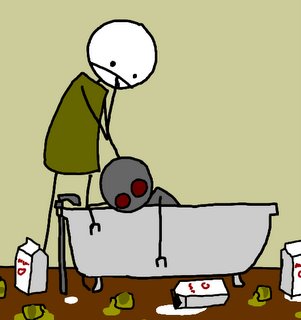I just had that phrase pop into my head earlier this morning. On a somewhat related and certainly topical note:
Decoding 'Brokeback'
Why women get it and men don't go
By Brendan Tapley. Brendan Tapley is writing a memoir on masculinity. His work has appeared in The New York Times and Carolina Quarterly
Published February 26, 2006
WOMEN AS THE WEAKER SEX? Not at the 3:40. Definitely not at the 7:15. And, by a good margin, not at the 5:30 or 8:30 shows either. This is how many times I've seen "Brokeback Mountain," and each time I've checked out the crowd. The audience for the film-a film about men and masculinity, a film that can be hard on women-is curiously female. As the pre-show begins, they are still coming-often five-wide, with pocketbooks and gloves, cell phones out while bathroom visits are taken in turns. "Gail," the woman behind me whispers. "Should we call Kate? There's still time."
Ever since I discovered Annie Proulx's short story, I've regarded the work as a gift to men, an illuminating translation of masculinity, a revealing playbook for all its codes and quirks. And while reading is a solitary thing, the movies are usually a group outing. Upon learning the story was to become a film, I briefly entertained the fantasy of men dropping their snowblowers and weedwhackers, powering down their laptops, setting aside their beers and getting together for screenings at the nearest Cineplex. A Male-a-palooza.
But it shouldn't surprise me that row upon row keeps filling up with women. Maybe what should surprise me is the tsks, the sighs and the audible ache coming from these women. Their reactions to this cowboy connection-a connection that doesn't appear to include them-are as urgent and personal as mine.
In college I was invited to a different kind of cinematic outing in a friend's dormitory room. On the quad I had been told that everyone was getting together for some pizza. That wasn't a lie; there was pizza. There was also a bootleg copy of some X-rated film scrolling before five pairs of eyes. Male pairs of eyes.
I'm considering this on the way back from watching "Brokeback Mountain." If I were still in college, how many of those men would have joined me and the women for a showing of this film? Recalling each of their faces, I can hear the conversation go down:
"Feel like going to a movie?" I'd ask. It would have been a similar kind of Sunday, snowy and inert, the kind made for matinees.
"Sure, which one?" my roommate would call from under his covers.
"I'm thinking, 'Brokeback Mountain.' "
"The gay movie?"
"It's not a gay movie."
"C'mon, man. I've read about it," my second roommate in the bunk above me would dispute.
"I mean, yeah, it's got gay characters."
"Are there two guys in it that screw around with each other?"
"Yeah, but . . ."
"Yeah, we're not into seeing that," he'd speak for the other. "The movie or the other stuff." They'd both chuckle at that one. "What else is playing?"
I wasn't sure how long the film would stick around the rural wilds where I live, so even though I had hoped to go with someone, I didn't wait around. Now, thinking about those college guys again, I find myself relieved to have gone alone. Just like they wouldn't have been seen in the company of the "Brokeback" audience, I realize I didn't want company at all. I wanted the pleasure of undivided attention.
"Brokeback Mountain" deserves such quiet. It is a film that feels like a Catholic confessional-private, solemn, intimate. Even though it's an anonymous encounter for the moviegoer, it singles out everyone watching. Every time I've gone, the walls of the room fall away. Even though there's a sellout crowd, there's no one else around you. The movie provokes the silence of internal confrontation. The kind summoned on long drives and 3 a.m. wake-ups.
In the dorm room for the other matinee, there was no quiet. In fact, any quiet was quickly dispatched by the raucous and ribald. Jeers and posturing. The dark compact of a movie theater was gone too. It was plainly obvious whom you were joined by and what parts appealed to (or disappointed) which people. And, as you might suppose, the afternoon offered the opposite of interiority. No one was soul-searching in that room.
But more than all this was the fact that there were no women. I realize the strangeness of expecting the company of women while watching an X-rated film featuring them; that's not what I mean. What I'm talking about is the strangeness of men having no problem watching an X-rated film with other men. That's more of a sexual situation than you'll find in the two-plus hours of "Brokeback Mountain."
Which begs the question: How is it that men can be intimate with each other when it comes to sex but not love? The Monday morning following my seeing the film, a co-worker tells me she is eager to go. But, she says, she will go alone; she won't even bother asking her husband. "You know, I honestly don't understand. What's the big deal? I mean, he has no problem going to a bachelor party with some hooker performing in front of him and a bunch of friends, doing God knows what . . . but this is somehow more troubling?"
Troubling. It's an interesting word choice. It would be easy to argue a man's resistance to the movie stems from the depiction of homosexual sex. But why is that such a widely accepted explanation? Again, there isn't much sex in or on "Brokeback Mountain." Compared with the minutes and positions-and positions in minutes-of the dorm film, it's positively demure. No, I don't buy that. But I do buy the word. Troubling.
For something to be troubling, I'd argue, it has to be possible. The possibility of terrorism might be remote where you and I live, but it's troubling all the same because it's not impossible. It could apply. While there isn't the kind of X-rated sexuality in "Brokeback Mountain" that men are comfortable gathering around, there is a lot of something else more taboo. In fact, it's in almost every scene.
It arises when the limitations and aspirations of two people's longing lay siege to one another. "Brokeback Mountain" is a war film without the bullets, the patriotism, the acceptable camaraderie of boys loyal to one another. Its allegiance is to a principle much more universal and much more dangerous for men: the bravery of submitting to the heart. I believe that's what's troubling to guys.
Along those lines, what also may be troubling for men is that the people who are seeing "Brokeback Mountain" may come to expect their husbands, boyfriends, brothers and sons to raise an army equal to this mission: the one that recognizes the fear in love but loves fearlessly anyway.
And yet, in my multiple viewings of the movie, I've come away believing this is precisely what men secretly want. The problem is not the object of affection but the obstacle of it.
We're alive in a time where there is no masculine identity. Men define themselves by what they are not. Not female, chiefly, and by extension, not gay.
The emotional "trappings" both women and gay men personify become areas to avoid for men, who fear guilt by association in the eyes of their friends. Even watching a film whose central question is not gayness but the culture's permission of male love risks the manhood of the men in the audience.
It's wonderfully deft that a film about the archetypal male-the cowboy-exposes the central weakness of masculinity. When it comes to connection, men are the weaker sex.
Still, human connection is the human condition. How can we sidestep it and not expect profound consequences? Such a taboo-such a weakness-may be a mountain, but until it's conquered, our culture will suffer more generations of men looking to be men in the wrong places: dorm rooms, bachelor parties, Friday night wings at Hooters, corporate boardrooms. Or, more tragically, in another kind of theater: war.
Every man should have a "Brokeback Mountain," some moment in time where our desire for connection outweighs our preoccupation with perception. I don't think a woman can address this particular male desire, because the connection I mean isn't about sex or sexuality. It's about identity. And the identity of a man seems most naturally derived from intimate fellowship with other men.
Judging from the women in the audience, I don't think they'd mind being left out of that connection. I can't speak for all of them, but Kate got there on time. During one moving scene, I heard her whisper about Jake Gyllenhaal's character, Jack, "That's my man!"
Maybe, in the daring involved in connecting with other men-fathers, brothers, best friends, old roommates-in ways previously off-limits, the occupying force of masculinity will give way to a liberating one. And by men submitting to the heart, wives, mothers, sisters and best friends should benefit too. Then, there would be no weaker sex.
At the end of the film, there's a scene where Heath Ledger's character, Ennis, the reluctant romantic, tacks a postcard of Brokeback inside his closet door. For the first time, the scale of the film is reversed, and the great outdoors is overshadowed by the great indoors. Here, the grand myth of American masculinity finds its last frontier not in the vastness ahead but in the boundless inside. He seems, for the first time, triumphant.


